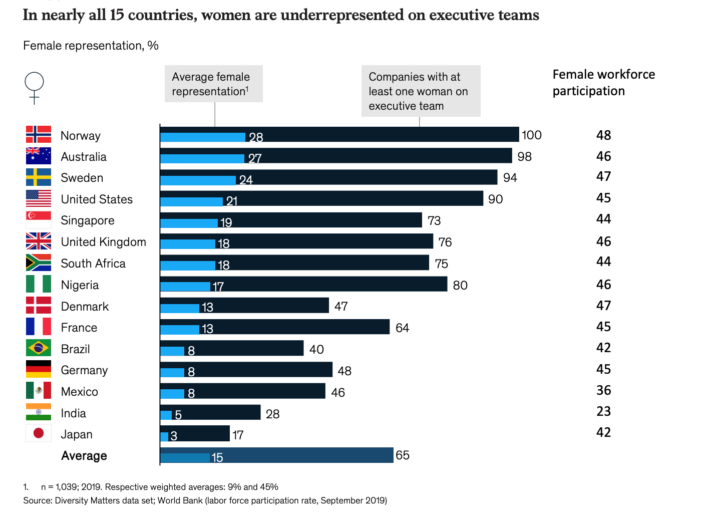As we search for the ‘next normal’, innovation has come to be a much-needed skill for individuals, companies and for the wider real estate industry. The top soft skill that real estate professionals would like to learn or develop is innovation, according to Building Skills for the Future, a report commissioned by the London Property Alliance.
A well-run business is also an innovative business. And research shows that companies with inclusion & diversity at their core have a broader ability for innovation. “Inclusion and diversity are critical for business recovery, resilience and reimagination,” writes management consultant McKinsey in their report, Diversity Wins, released this May.
A diverse culture is one that reflects all facets of society; gender, race, ethnicity, age, sexual identity, education, social background, and so on. A culture that is not diverse, and inclusive, leads to social inequality. In Britain, for example, inequality has become “entrenched from birth to work”, reveals a government report.
Why diversity is important for real estate
As the #blacklivesmatter movement has gained momentum, diversity – especially when it comes to race and ethnicity – has been creating much debate. The Financial Times released a video earlier this summer to look at the question of Is race and class discrimination hurting business?
Interviewed in the video is Ric Lewis, co-founder of Tristan Capital Partners, the pan-European investment manager with more than €14.21bn of assets under management.
“In this radically changing world, if your business is built on the assumption that diversity and inclusion is a nice to have, this is unstable territory” – Ric Lewis, Tristan Capital Partners.
June Sarpong, broadcaster and author of Diversity, asks Lewis in the FT video: “Is it a critical ingredient to be diverse and inclusive to be a successful business?” Lewis answers: “No. But it is a critical ingredient if you want to stay here. In this radically changing world, if your business is built on the assumption that diversity and inclusion is a nice-to-have, this is unstable territory.”
So what are the advantages of having an inclusion & diversity culture at work? Diversity creates a wider pool of talent, in terms of experience, insight and thinking styles. This in turn creates an ‘uplift in collective intelligence’, writes Matthew Syed in Rebel Ideas, who is quoted in the London Property Alliance report.
That “uplift in collective intelligence” is much needed in today’s world, where the challenges are often too complex for one person to solve on their own.
“The way in which people are using buildings is changing at the speed of light, and we need to be ahead of it to enable us to stay relevant and to be competitive” – Lisa Reynolds-Jones, Landsec
“The way in which people are using buildings is changing at the speed of light, and we need to be ahead of it to enable us to stay relevant and to be competitive,” says Lisa Reynolds-Jones, learning & development manager, Landsec, in the Building Skills report.

The damage of unconscious (and conscious) bias
When it comes to racism, this is something that many people in more privileged social positions are not aware of; they only catch glimpses of it happening, rather than knowing what it is like to be at the receiving end. The reality is that racism also comes in the form of ‘microaggressions’ – things said or done by others, most often unintentionally, that chip away at our self-worth, self-identity, and affect performance at work. At worst, they can be traumatic, wrecking lives and futures.
In Unravelling Unconscious Bias, behavioural & data scientist Dr Pragya Agarwal writes of how we start forming biases when we are very young. “We are reluctant to re-evaluate our beliefs and like to believe that we are all egalitarian and carry no biases,” she writes.
Our conscious mind is only capable of handling 40-50 bits out of the 11m bits of information that we process subconsciously every second. To cope with this information overload, we veer naturally towards taking decisions that subconsciously reinforce our own biases, Agarwal writes.
“We judge, we exclude people, we stereotype… Privilege provides you with an armour against many of the societal biases and stereotypes” – Pragya Agarwal
The first step with regards to racism is to acknowledge our own behaviour, writes Agarwal: “We judge, we exclude people, we stereotype… Privilege provides you with an armour against many of the societal biases and stereotypes.”
‘Human’ management leads to a culture of innovation and inclusion
During this time of change, as companies look to build resilience, we need management theories. They bring a sense of clarity and reassurance, writes Gianpiero Petriglieri, associate professor of organizational behaviour at INSEAD, in the Harvard Business Review. “But new theories? They seem to be nowhere in sight.”
In his article, Are our management theories outdated?, Petriglieri puts forward the idea that “regardless of your age, and whether you are a manager or not, you are caught with us in a mid-life crisis of management”.
“The unease that many have felt at work over the past months and years… is due to management’s unwillingness to contemplate a shortage of its own future” – Gianpiero Petriglieri, INSEAD
“The unease that many have felt at work over the past months and years and feel most acutely now, in the face of a global health and social crisis, is not due to managers’ inability to prepare for the future,” he writes. “It is due to management’s unwillingness to contemplate a shortage of its own future that is only becoming more obvious and urgent.”
“A human management theory is based on curiosity and compassion. This in turn makes a culture of innovation and inclusion much easier to achieve” – Petriglieri
Like a mid-life crisis of age, we now have the opportunity to “transform, free up and humanise”. He continues: “Humanisation is much needed … but it must go much further than the usual rhetoric of purposeful leadership, an airbrushing of humanism to make management nicer. It must become its core.”
Inclusion & diversity makes financial sense
“Over the past five years, the likelihood that diverse companies will outperform their industry peers has grown,” says McKinsey, who started tracking diversity and inclusion in companies in 2014.
Hiring diverse talent isn’t enough—it’s the workplace experience that shapes whether people remain and thrive,” says McKinsey in their latest report, Diversity Wins, which tracks over 1,000 large companies in 15 countries around the world.
The results of McKinsey’s most recent inclusion & diversity survey show that:
- For gender diversity, companies in the top quartile outperformed those in the fourth quartile by 25 per cent.
- For ethnic and cultural diversity, the top quartile outperformed the fourth quartile by 32 per cent.

Exhibit from “Diversity wins: How inclusion matters”, May 2020, McKinsey & Company, www.mckinsey.com. Copyright (c) 2020 McKinsey & Company. All rights reserved. Reprinted by permission.
Yet progress has been slow, and some companies have even gone backwards. “Companies are still uncertain about how they can most effectively use inclusion and diversity to support their growth and value-creation goals,” writes McKinsey.
While McKinsey has their own recommendations for the business world as to how to make the workplace more diverse and inclusive, the World Economic Forum suggests 7 steps to uprooting systemic racism:
- Remember you can do better
- Define you organisation’s commitment to diversity and inclusion
- Promote diverse leadership
- Track progress, monitor turnover
- Recognise overlapping identities and experiences – whether race, class, gender, sexual orientation, religion, immigration status.
- Adopt an abundance mentality – “promoting diverse individuals does not mean you cannot promote others”.
- Continue the dialogue, as racism doesn’t just disappear
As Madrid-based artist Angelica Dass – who founded the Humanæ Institute to eradicate misconceptions about race – said on Instagram, with the message also emblazoned on her t-shirt: “It’s not pie. Equal rights for others does not mean less rights for you.” It sounds like an opportunity for me.
Top Image: Getty Images – Charday Penn



